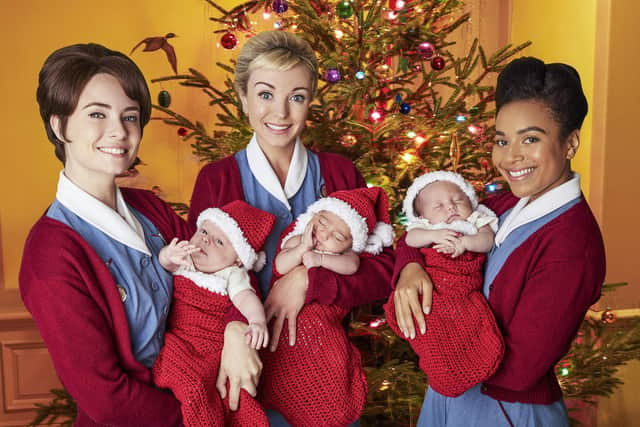We've swapped personal touch of Call The Midwife for conveyor belt healthcare: Daxa Patel
I was born at a time when my mother would have had a dedicated family doctor, a midwife, and a district nurse to care for her during her pregnancy. Now, these services are a lottery. Having acted for clients during my days as a clinical negligence solicitor dealing with childbirth injury cases, I know of many instances where expectant mothers felt isolated and unsupported. Matters are often worse if their first language is not English.
In Call the Midwife, a series set in the 1960s, we see community and one on one midwifery care. Home births were common, women were given a choice.
Advertisement
Hide AdAdvertisement
Hide AdEnd of life care was empowering unlike today unless one is lucky enough to have a supportive family, or hospice care. A District Nurse was someone who knew the patient and their family environment as patients were often visited at home. Now we have a ten minute appointment if we are lucky to get through the door of our GP practice, and we see a nurse or a GP who knows little other than what they can read on the computer screen about our history.


We are in a conveyor belt society, one in one out with no continuity of care now. I probably had the best care when I was born but it might well be the opposite when I die. That is a reality for probably all of us given the state of our health care today.
A couple of days ago the BBC reported the digital shift creating health barriers as reported by Healthwatch Leeds which said online booking was not right for everyone. This effectively leaves people unable to access medical care when they need it.
The local health and care watchdog asked people across the city about their experience of booking appointments in a survey. Booking over the phone or online was noted to be difficult for the elderly, and those with sight or hearing issues, or people who were not familiar with the internet. According to the chief executive, Hannah Davies, “People are just giving up, because of the barriers are impenetrable.”
Advertisement
Hide AdAdvertisement
Hide AdWhile the pandemic caused a shift not only in remote working but also towards supposed digital healthcare, the reality is we have ‘digital’ but no ‘healthcare’! I know if my father were here, and I was not he would have not medical support.
People’s health suffers more when they get frustrated trying to get help, and this is compounded as it takes a huge amount of courage to ask for help in the first place, let alone have someone in our world whom we can ask to help us.
Of course, for online users it might be easier doing things online, but we do have a sizeable population who may struggle. According to the ONS Census 2021 on the profile of older population living in England and Wales, 3.3 million over the age of 65 were living alone. Also, almost 1.2 million unpaid carers were over the age of 65, and just over one in ten of the older population, more than half of these were providing more than 50 hours of unpaid care a week.
If we imagine these figures to be worse now, we can apply our imagination on how onerous it must be for these people to fight for medical care for themselves, and for their loved ones, if a. they are not familiar with digital technology, b. they are working far longer than a full time office worker, and that too unpaid.
Advertisement
Hide AdAdvertisement
Hide AdI read a piece by Matt Rudd in the Sunday Times magazine titled, “Dr. Google is the closest I’ll get to seeing a GP”. If an articulate person feels this way, we can surely understand the frustration of those who cannot even use ‘Dr. Google.’
We are setting a dangerous precedent by accepting the status quo and by feeling grateful that it is better than nothing, but for some it really is nothing. I fear ageing yet I can find ways to get help but what about those who cannot.
Google cannot be the answer or replacement to seeing your GP. GPs are in a tight spot but so are we. Just like the Post Office who would do anything to deny the Horizon failures, the politicians are doing everything to fudge how they propose to bring in short-term (emergency) reforms and long-term changes.
I had the best childhood and I had two great family doctors. As a child we had a Dr. Kitchen. She knew me and was privy about my parents’ breakup. I recall her opening her desk drawer to give me some Smarties while she tried to figure out how I was feeling about the separation. Then I had Dr. Rickards, who was with me and my dad in his final days, this was only ten years ago. My hope for a child today is that they are seen and heard. I would hope for them to have a caring family doctor like I did who knows about the family dynamics.
Advertisement
Hide AdAdvertisement
Hide AdAll said, one big piece of this sorry tale is missing, doctors qualify to become doctors because they care. Let them show compassion and empower them to be family doctors again. Make the system so we regain that warm fuzzy feeling that we are a community, and our family doctor has our back.
Comment Guidelines
National World encourages reader discussion on our stories. User feedback, insights and back-and-forth exchanges add a rich layer of context to reporting. Please review our Community Guidelines before commenting.